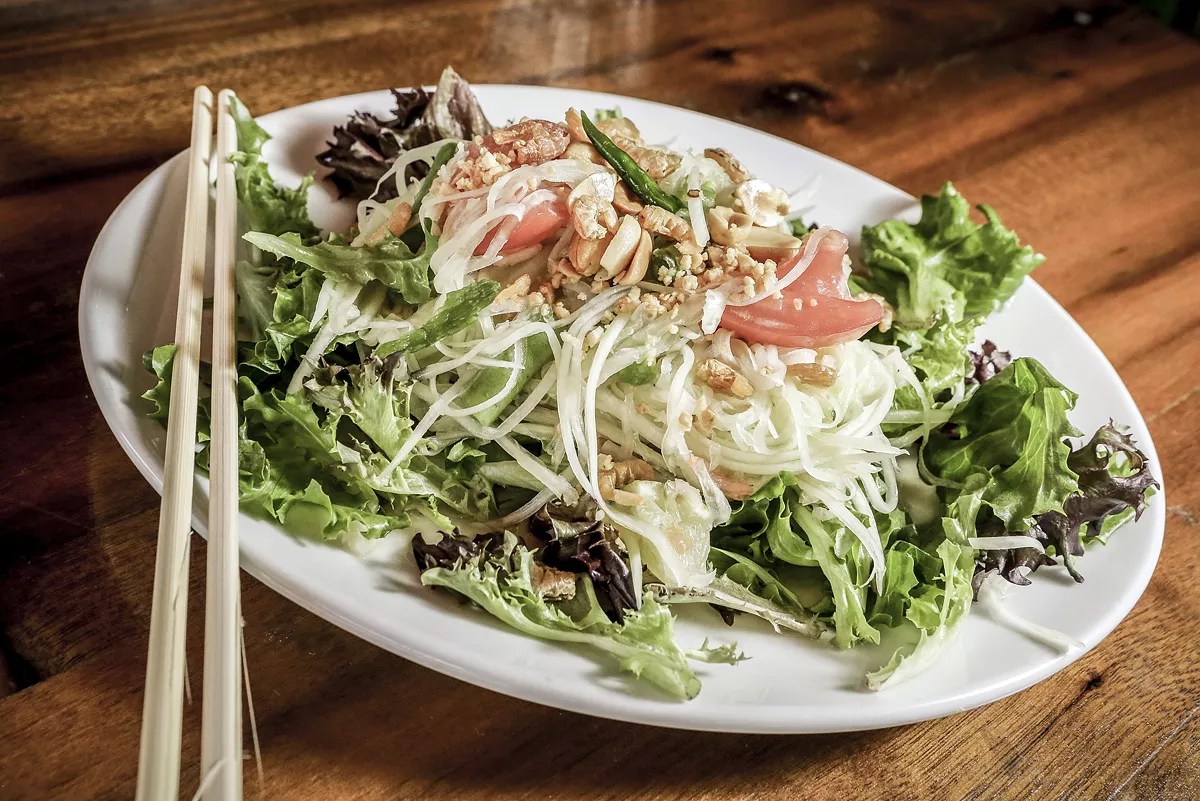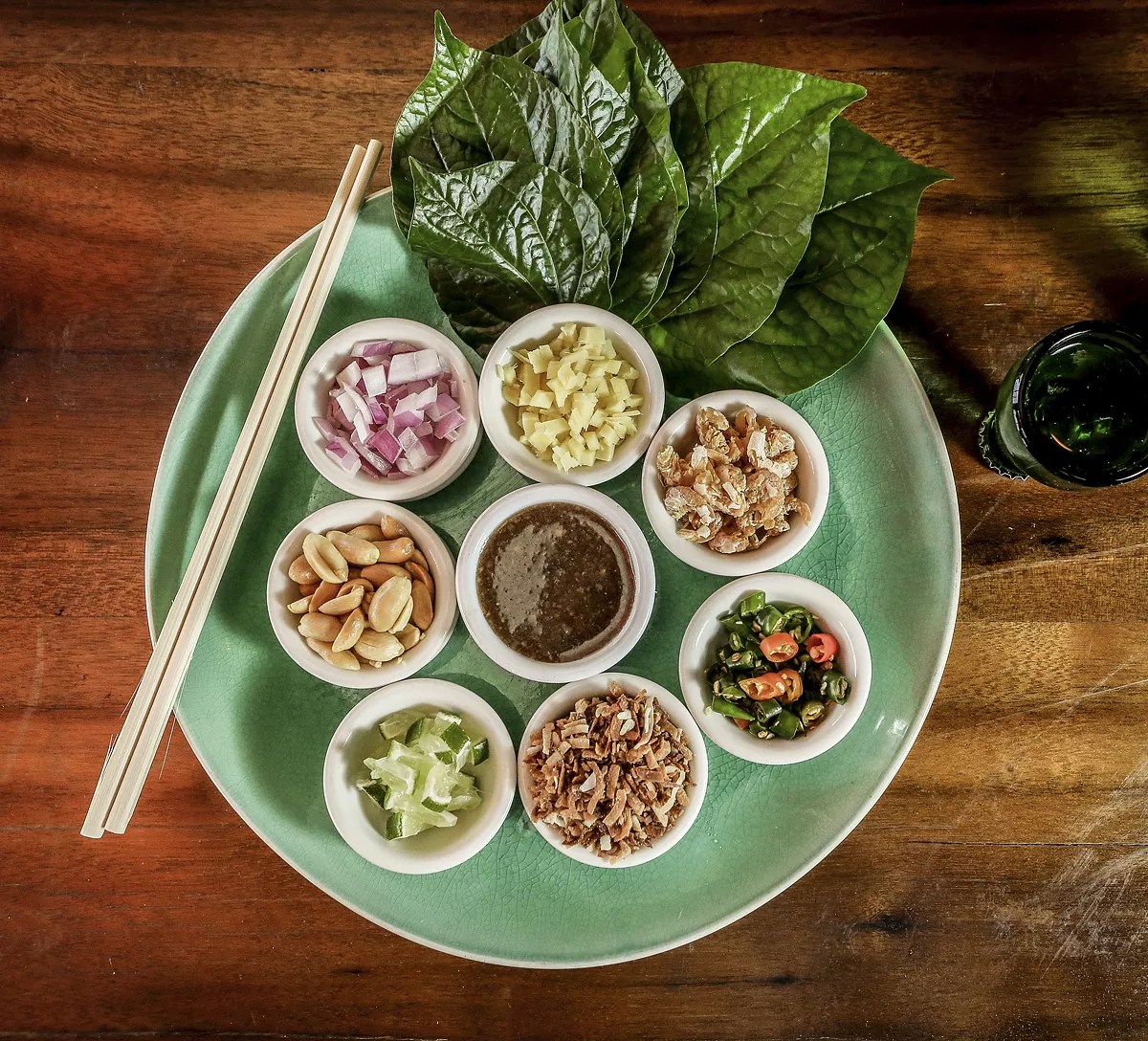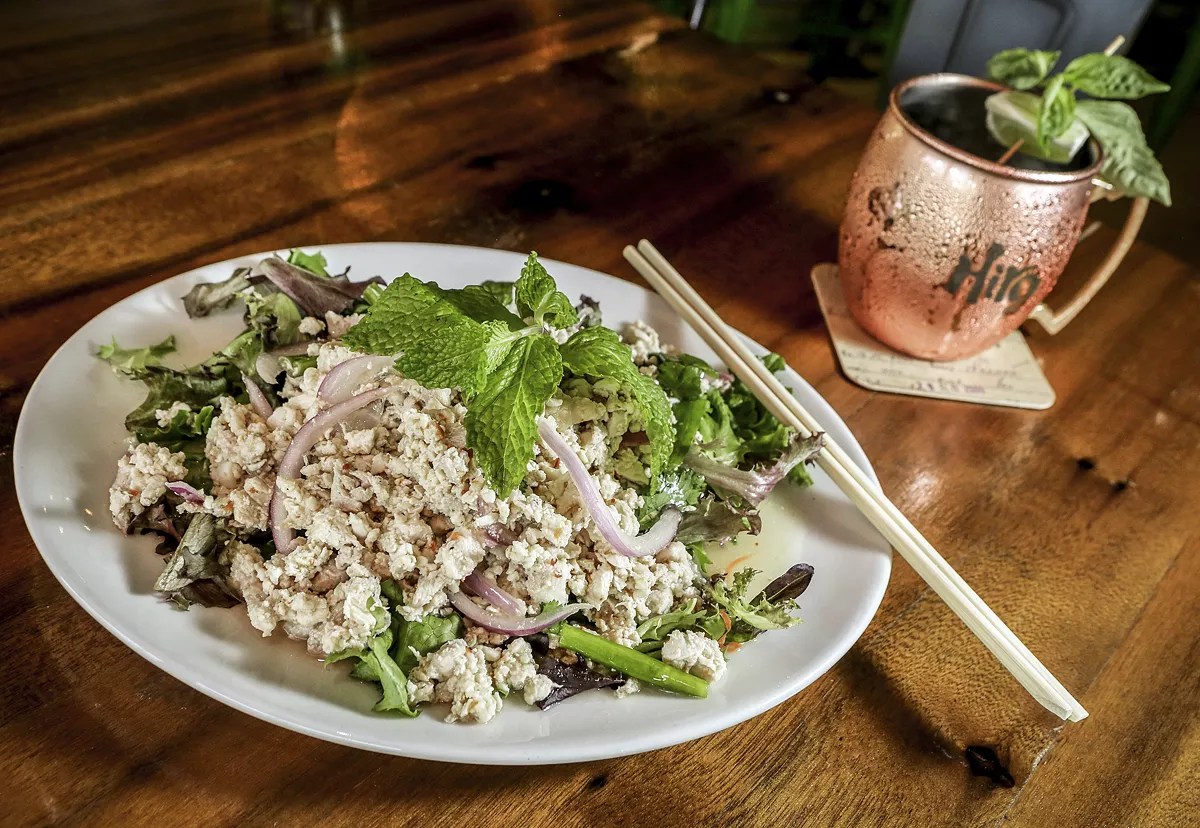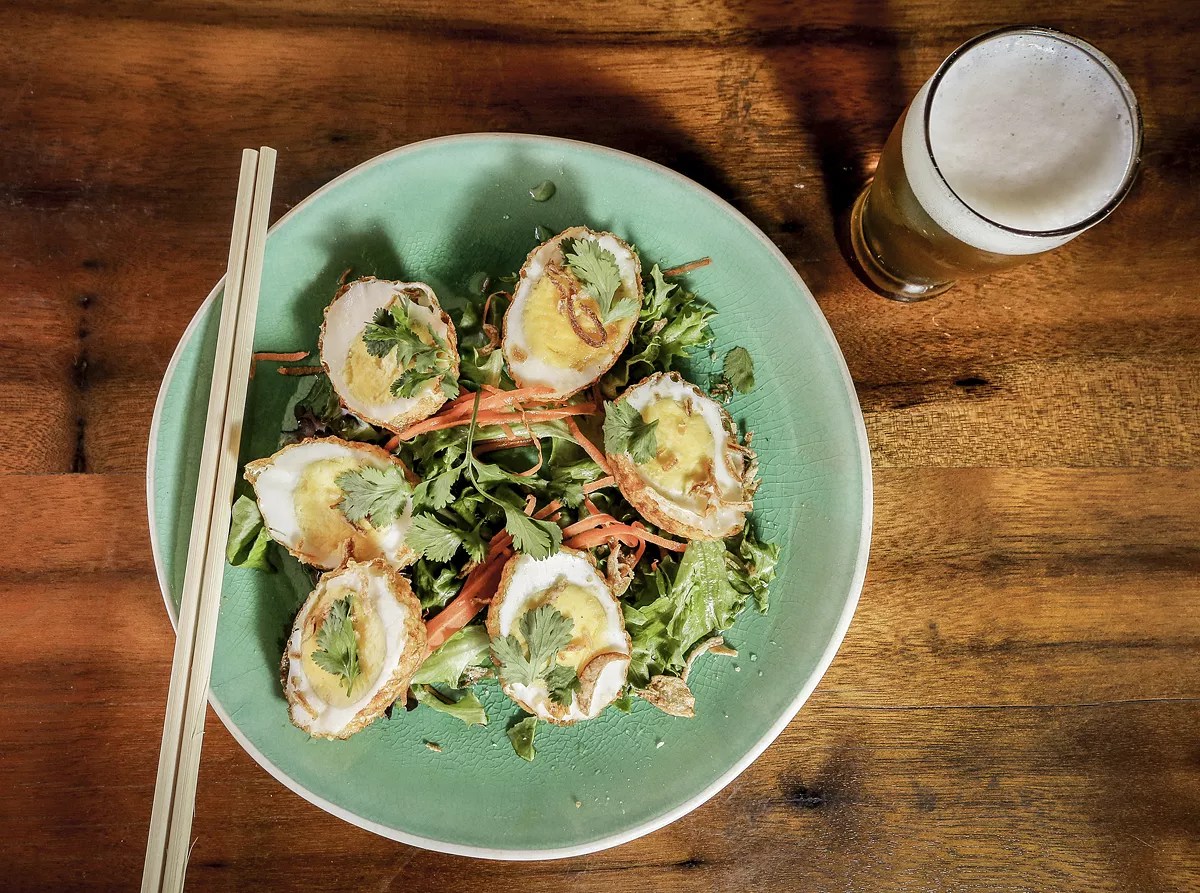
Photo by CandaceWest.com

Audio By Carbonatix
The miang kham at Atchana’s Homegrown Thai isn’t a lettuce wrap. One of the many small dishes arranged on a large plate holds wrinkly pale-pink dried shrimp. In another are toasted coconut flakes. Yet another bears tiny beige cubes you later learn are bits of ginger and garlic. Even the leaves look different. Rather than the ruffled bright-green fronds of buttery iceberg lettuce, these betel leaves are deep green and spade-shaped, with an almost unnoticeable flavor.
But when they’re all combined with a few bits of crushed peanuts, sliced shallots, a squeeze of lime, and a dash of spicy-sweet tamarind sauce, the flavor rings true to the name: the perfect bite. The coconut’s sweetness underlines the dried shrimp’s salty savoriness. The ginger and shallot add a spice that’s hemmed in and rounded out by the coconut and sour tamarind.
The dish has been a mainstay throughout 50-year-old owner Atchana Capellini’s life, but like many of her favorite Thai foods, it somehow never made it onto the menus of the family restaurants she’s either worked in or owned during her three decades in Miami.
There’s no expectation or plan to set every customer’s face on fire.
All of that changed this past January, when she opened her namesake restaurant on the corner of Commodore Plaza and Grand Avenue in a narrow space bordered on one side by floor-to-ceiling windows and on the other by a jigsaw puzzle of weathered wood boards. The wall at the far end of the room is covered by a mural-size photo of a Thai street scene with men squatting on plastic stools while hungrily slurping up noodles from steaming bowls. Here, Atchana’s lifetime in restaurants has come to its apex, evidenced by everyone from grandparents to young families and 20-somethings on Tinder dates devouring more familiar Thai plates such as massaman and panang curries alongside the spicy, salty, sour dishes that are the hallmark of the Southeast Asian nation.
Capellini (she picked up the last name when she married her Italian husband) was born and raised in the city of Nakhon Ratchasima, in the northern region of Thailand called Isan, where the food is spicier and more focused on fresh ingredients.
“The food we grew up with was what you could call country-bumpkin Thai,” she says. “We would have a lot of sticky rice, papaya salad, larb, fish, and shrimp pastes.”

Miang kham
Photo by CandaceWest.com
When she was 12 years old, her parents moved her and her brother to Miami for a better education. Atchana arrived with hardly any ability to speak English but excelled in math and science.
Meanwhile, her parents and extended family, who had always owned and run restaurants in Thailand, began to serve their food, albeit heavily modified for American palates, across Miami.
In the early ’80s, they opened House of Siam on LeJeune Road. A few years later, her parents opened Bangkok Inn in West Dade. Toward the end of that decade, after her parents sold House of Siam, an uncle opened Thai Café in Miami Lakes. Then, in the early ’90s, her family purchased Siam Lotus Room, housed in what was once a no-tell motel on South Dixie Highway known far and wide for its hideous green paint job. Yet this is where the family’s reputation, and loyal customer base that now spans generations, began to solidify. Atchana took over the place in 2000 and ran it for the following decade until it closed.
During all of that time, however, change was afoot.
“Twenty years ago, our customers used to link Thai food to Chinese food, and that used to really rile me up,” she says. “Now they’re more sophisticated: They’ll eat the papaya salad at a Thai spice level; they know the difference between ginger and galangal. Everything has changed.”
The menu here is a fraction of the size of those at her other places: a mere two pages compared to ten or more in years past. And though you can still work your way through the familiar with dishes such as chicken wings and vegetable rolls, there’s far more in which to dabble. That green papaya salad, for which the unripened fruit is sliced into thin ribbons, is washed with musty, savory fish sauce whose oiliness is tempered with palm sugar, turning it into an oceanic caramel. Little dried shrimp throughout the knots of papaya add a savory, chewy hit to each bite as peanuts lend a sweet, earthy crunch.

Larb gai
Photo by CandaceWest.com
Spice levels are hard to judge, and though servers will offer you a choice of mild, medium, hot, or Thai hot, the medium for me struck a pleasant balance of being spicy enough to make my nose run without being so unbearable I couldn’t return for another bite.
It worked well in the larb gai, which is an Isan-style preparation of the ground meat, chili, and herb dish that’s ever varied and present throughout Thailand. Atchana’s does it with skin-on chicken that’s finely minced and quickly poached so it remains juicy. The meat is then dressed with a brightening purée of lime juice, basil, and lemongrass, giving it a fresh, herbaceous snappiness. Dry-roasted rice kernels add a happy crunch, while varied amounts of bird’s-eye chili add the spice.
Yet there’s no expectation or plan to set every customer’s face on fire. The dish called pad krapow is an easy way to pack all of Thailand’s flavors into a single bite with minimal heat. Limes, shallots, basil, and ginger upstage the chilies and gloss a bright, tangy sheen with pleasantly funky whiffs of fish sauce onto ground chicken and snappy green-bean spears. Even less threatening is the pad see ew, in which wide, jiggly rice noodles are stir-fried in sweet soy, chicken, crisp bits of scrambled egg, and Chinese broccoli. Either dish is a cooling pairing to any of the hotter offerings.
Pad thai is also a must, not because it’s one of Thailand’s better-known dishes, but because the one here, like the one found at Cake Thai, is a re-education in what pad thai should taste like.
“Everyplace makes it too sweet and peanut-buttery,” Capellini says. “Some places put ketchup, which shouldn’t be part of the equation because there is no ketchup in Thailand.”

“Son-in-law eggs”
Photo by CandaceWest.com
The pad thai’s pale-orange hue comes from tamarind pulp. The slightly sweet-and-sour amalgam is enhanced with palm sugar, fish sauce, and a bit of oil. That’s it and how it should be. Simply toss the noodles together with the scallions, shrimp, egg, and minced pork and take note how this dish ought to taste.
Of course, in some parts of the menu, small concessions are made to accommodate all of Atchana’s customers. One night, a waitress calmly explained to an older couple why the kitchen didn’t have crisp wonton noodles on hand to sprinkle over their yellow curry chicken. Not that the bowl that smacked of turmeric, coriander, and cumin needed it anyway. But while many places’ coconut curries taste only of the sweetened cream, the kitchen here laces it with enough garlic, ginger, and chilies to give each bite a balanced flavor.
So although there’s something for everyone at Atchana’s, it would still behoove you to step beyond the familiar. After all, how else would you learn about the dish the menu lists as “son-in-law eggs”? Sure, the hardboiled eggs that are deep-fried to give them a crisp crust and then split in half and fluttered with fried garlic, cilantro, and daubed with tamarind sauce are a great way to start the meal. But it’s their backstory that you also don’t want to miss.
“When a young man gets married, his father-in-law will hard-boil some eggs, then fry them so they get nice and crispy,” Capellini explains. “Then he serves them to his soon-to-be-son-in-law and says, ‘If you don’t treat my daughter right, well, this is what your balls will look like.'”
Atchana’s Homegrown Thai
3194 Commodore Plaza., Coconut Grove; 305-774-0404; atchanas.com. Sunday through Thursday noon to 10 p.m.; Friday and Saturday noon to 11 p.m.
- Son-in-law eggs $8
- Larb gai $15
- Miang kham $14
- Som tam thai $14
- Pad thai $17
- Pad see ew $17
- Chicken yellow curry $17